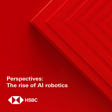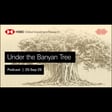Become a Creator today!Start creating today - Share your story with the world!
Start for free
00:00:00
00:00:01

Under the Banyan Tree - Nvidia, Bitcoin and enough cement to turn Britain into a carpark
Fred Neumann and Herald van der Linde sink their teeth into some quirky facts on Asian markets and economics, as they comb through Herald’s latest '13 surprising stats' report. Disclaimer: https://www.research.hsbc.com/R/101/2kTNx6l. Stay connected and access free to view reports and videos from HSBC Global Research follow us on LinkedIn https://www.linkedin.com/feed/hashtag/hsbcresearch/ or click here: https://www.gbm.hsbc.com/insights/global-research.
Hosted on Acast. See acast.com/privacy for more information.
Transcript
Introduction to HSBC Global Viewpoint
00:00:02
Speaker
Welcome to HSBC Global Viewpoint, the podcast series that brings together business leaders and industry experts to explore the latest global insights, trends, and opportunities.
00:00:13
Speaker
Make sure you're subscribed to stay up to date with new episodes.
00:00:16
Speaker
Thanks for listening.
00:00:17
Speaker
And now onto today's show.
00:00:24
Speaker
This is a podcast from HSBC Global Research, available on Apple Podcasts and Spotify.
00:00:29
Speaker
However you're listening, analyst notifications, disclosures and disclaimers must be viewed on the link attached to your media player.
Meet the Hosts: Fred Newman & Harold van der Linde
00:00:45
Speaker
Hello from Hong Kong and welcome to Under the Banyan Tree, where we put Asian markets and economics in context.
00:00:51
Speaker
I'm Fred Newman, Chief Asia Economist.
00:00:53
Speaker
And I'm Harold van der Linde, Head of Asian Equity Strategy here at HMZ Global Research.
Exploring the '13 Quirky Stats' Report
00:00:58
Speaker
Here's a question for you listeners.
00:00:59
Speaker
What do NVIDIA's market cap, Korea's love of online shopping and all the cement in China have in common?
00:01:04
Speaker
Well, the answer is they're all part of my co-host's latest 13 quirky stats report, which I'm delighted to say is a focus of today's show.
00:01:12
Speaker
Plenty of weird and wonderful facts coming your way.
00:01:16
Speaker
It's time for you to join us under the banion tree.
00:01:19
Speaker
Weird and wonderful, just like my co-host.
00:01:21
Speaker
Yes, yes.
00:01:27
Speaker
So Harold, another great report from you here.
00:01:31
Speaker
The Flying Dutchman, of course, being back with his favorite 13 statistics.
00:01:36
Speaker
It's been a regular report now.
00:01:39
Speaker
By the way, why the Flying Dutchman?
00:01:40
Speaker
I know you're Dutch and I know you fly a lot.
00:01:42
Speaker
There are eight sorts of Flying Dutchman.
00:01:44
Speaker
Of course, I fly a lot and I'm Dutch.
00:01:46
Speaker
So that helps, right?
00:01:47
Speaker
But it's also a KLM in-flight magazine.
00:01:50
Speaker
Apparently a horse that run.
00:01:52
Speaker
It's, of course, a ship that went down in the 1800s or something like that in...
00:01:56
Speaker
South Africa, there's an opera.
00:01:58
Speaker
I've got the other one.
00:01:59
Speaker
But I've counted that there are eight or nine.
00:02:01
Speaker
And there's a DJ in Singapore that calls himself the Flying Dutchman as well.
00:02:04
Speaker
So there are all sorts of Flying Dutchmans and I'm one of them.
00:02:08
Speaker
So I find it encouraging that you name your flagship report after shipwreck.
00:02:12
Speaker
So with that said, great, great statistics you always
NVIDIA's Market Cap vs. Philippine Stock Market
00:02:17
Speaker
pull out.
00:02:17
Speaker
There's a lot going on.
00:02:19
Speaker
So one is obviously NVIDIA, the U.S. semiconductor company.
00:02:24
Speaker
It's been on a tear.
00:02:25
Speaker
Absolutely.
00:02:27
Speaker
Put that in perspective.
00:02:28
Speaker
What does that mean?
00:02:29
Speaker
Yeah, no, I mean, you can make these great comparisons in stock markets because one stock goes up, the other one goes down, and things come a little bit out of whack sometimes, right?
00:02:37
Speaker
But think about this.
00:02:39
Speaker
NVIDIA, on one single day, the 22nd of January 2024, had an increase in market cap.
00:02:46
Speaker
So the size of this company, the value of this company, went up $277 billion.
00:02:53
Speaker
Just imagine how much that is.
00:02:54
Speaker
That is the total size of the Philippine stock market.
00:02:58
Speaker
It's just incredible.
00:02:59
Speaker
So you can see the size difference.
00:03:01
Speaker
And this also tells you, and it's not completely fair, but how big the U.S. market is and how important developments in the U.S. market are to stock markets elsewhere.
00:03:11
Speaker
That's why we always talk about U.S. bond yields, because that drives that to a certain extent as well.
00:03:16
Speaker
So small wobbles there have a big impact right here.
Chinese and Hong Kong Stock Market Decline
00:03:20
Speaker
Now, if you put that in context with some of the Asian markets, for example, you write here that, you know, you talk about the sell-off, for example, in mainland Chinese stocks and Hong Kong stocks.
00:03:31
Speaker
Put that in context on the other side.
00:03:33
Speaker
So it's always easy to talk about the gains.
00:03:35
Speaker
Some stocks that have really done very well.
00:03:36
Speaker
This is a nice one.
00:03:39
Speaker
Mainland Chinese and Hong Kong stocks, they have not performed very well.
00:03:43
Speaker
So they've lost 4.8 trillion US dollars in market gap since 2021.
00:03:48
Speaker
So that's when after COVID China initially did very well, but then the market really started to come off.
00:03:57
Speaker
That is more than the market cap of all stocks in India.
00:04:01
Speaker
That is the size of India that has just disappeared from the Chinese market.
00:04:05
Speaker
And again, it tells you, because China is still there, how big China was from the very beginning, right?
00:04:10
Speaker
And how big it actually is still now, despite the massive decline in that stock market that we've seen over the last couple of years.
00:04:16
Speaker
So does that mean, so U.S. is clearly the biggest stock market and some of the single companies in the U.S. have enormously big.
00:04:24
Speaker
Talking about trillions of U.S. market cap, yeah.
00:04:26
Speaker
The mainland Chinese market has lost market cap.
00:04:28
Speaker
Is it still the second largest in the world or is the Japanese market now?
00:04:33
Speaker
So you've got multiple stock markets in China.
00:04:35
Speaker
So you've got Shanghai, you've got...
00:04:37
Speaker
The Chinese listed here in Hong Kong, you got Shenzhen.
00:04:40
Speaker
If you put all of them together, that is still the second largest stock market in the world in terms of size.
00:04:46
Speaker
And I believe still in trading as well.
00:04:49
Speaker
There's a lot of trading going on in particular actually in the Shenzhen market.
00:04:52
Speaker
There you go.
00:04:53
Speaker
All these headlines about, oh, you know,
00:04:55
Speaker
investors are shying away from Chinese stocks but still the second largest market
China's Cement Consumption and Construction Insights
00:05:00
Speaker
overall.
00:05:00
Speaker
I mean statistically maybe there have been times but I don't know exactly because Japan has done very well so maybe that has taken over but effectively it's the US has won, China is two and Japan is number three and they're vying maybe for a position there.
00:05:15
Speaker
Now, sticking with mainland China, there's another one here.
00:05:19
Speaker
Now, not market related, but you talk about cement consumption in China and how that compares.
00:05:29
Speaker
Yeah, so annual cement consumption in China is down 15% since 2020.
00:05:33
Speaker
So that's the start of COVID, give or take.
00:05:37
Speaker
That is still more than the US has consumed in cement in the last 20 years together.
00:05:43
Speaker
So again, the US is building infrastructure and needs cement.
00:05:48
Speaker
But what they've done over the last 20 years is basically what China has not consumed in the last couple of years.
00:05:55
Speaker
That is just, again, the amount of cement that's being consumed in China, which is, of course, still the emerging market economy that is building up its infrastructure, is just staggering.
00:06:05
Speaker
I mean...
00:06:07
Speaker
You're an economist.
00:06:08
Speaker
You must be looking at that as well.
00:06:09
Speaker
There's one statistic here that suggests, and it's hard to verify because there are probably a lot of assumptions that go in there, but there are experts who have calculated that China uses in three years more cement than you would need if you wanted to turn all of Great Britain into a car park.
00:06:26
Speaker
Now, I don't know whether it's a two or three-story car park, but it's certainly a lot of cement, yeah.
00:06:32
Speaker
There's a lot of cement that is still used because factories are being built and roads are being used.
00:06:36
Speaker
There is a slight subtlety, though, when we say China is using more cement than the U.S. in sort of 20 years or so.
00:06:42
Speaker
It's that building in China, mainland China, is much more cement intense than in the U.S. The U.S. uses much more steel for building large structures, whereas in China, they use much more cement.
00:06:56
Speaker
So it's not like for like, but still, it just speaks.
00:06:59
Speaker
And I guess this will change over time in China, right?
00:07:02
Speaker
Because China is now talking about building industries that are high-end tech and these sort of things, renewables, semiconductors.
00:07:11
Speaker
I guess they're not so cement intensive and more copper.
00:07:14
Speaker
That's right.
00:07:14
Speaker
The cement's intensive.
00:07:15
Speaker
And knowledge of course intensive.
00:07:16
Speaker
Yeah, that's right.
00:07:17
Speaker
Over time it will come down.
00:07:19
Speaker
So maybe in 15 years time we'll find that Bangladesh has got more cement consumption than all of China or something like that, right?
00:07:25
Speaker
So these things change over time.
00:07:28
Speaker
Yeah, that certainly, the building boom in China, the construction boom, is nearing a structural end, if you will, right?
00:07:38
Speaker
We've now rebuilt these cities.
00:07:40
Speaker
We've built the infrastructure.
00:07:41
Speaker
We moved the people, and now we move on to other things.
00:07:45
Speaker
Great series of statistics here, but I think before we delve deeper into some of the other ones, it's probably a great point to take a quick break.
00:07:53
Speaker
And when we come back, we'll look at Bitcoin.
00:07:56
Speaker
And that's suddenly back on your radar, Harold.
00:07:58
Speaker
So let's talk about that after the break.
00:08:00
Speaker
Good plan.
Bitcoin's Market Cap Phenomenon
00:08:10
Speaker
So Harold, we're all discussing here some of the key statistics that you dug out.
00:08:15
Speaker
Again, a great report.
00:08:17
Speaker
One of them relates to Bitcoin.
00:08:19
Speaker
And forgive me, but I thought, you know, we stopped talking about cryptocurrencies, but they've been roaring back again in the last several months here.
00:08:28
Speaker
So you talk about the market cap of Bitcoin.
00:08:31
Speaker
Yeah, so the market cap of Bitcoin, so there's the total value of Bitcoin outstanding.
00:08:36
Speaker
That's, of course, risen tremendously because the price of Bitcoin has gone up quite a lot.
00:08:42
Speaker
If you put all of that together, that is more than the GDP of 159 of the world's economies in 2023.
00:08:48
Speaker
Not combined.
00:08:51
Speaker
Individually.
00:08:52
Speaker
Individually.
00:08:53
Speaker
So it would be one of the largest economies.
00:08:56
Speaker
Otherwise it would be bigger than the whole world, right?
00:08:57
Speaker
Yes.
00:08:58
Speaker
Sorry.
00:08:58
Speaker
Yeah.
00:08:59
Speaker
So it is bigger than 159 countries.
00:09:03
Speaker
Each of these countries actually is smaller than the total value of Bitcoin.
00:09:09
Speaker
So imagine that.
00:09:10
Speaker
Some might argue there's more value being created in these economies than with Bitcoin.
00:09:14
Speaker
But we'll leave that to people who understand much more about cryptocurrencies than I do.
00:09:22
Speaker
So this struck me as interesting.
Korea's Online Shopping and E-commerce Dynamics
00:09:25
Speaker
online retail sales in Korea.
00:09:27
Speaker
So when Koreans go shopping, that's now increasingly done online, much more so than other places.
00:09:34
Speaker
Yeah, it's about 40%.
00:09:35
Speaker
So almost half of what they buy, four out of 10 things that they buy, is online.
00:09:40
Speaker
Now compare that in the US, it's about 25.
00:09:43
Speaker
So one out of four products that you buy comes out of an online website.
00:09:47
Speaker
And this is interesting because online retailing, e-commerce, has really taken off in Korea, but also in China, in Asia in general, more so than I think in Europe or the US.
00:09:59
Speaker
And what you now see is that the large, particularly large Chinese internet names, they're saying, well, we've learned our lessons on how to do that in, say, China.
00:10:08
Speaker
We're going to do this in the US.
00:10:09
Speaker
We're going to go to Europe.
00:10:11
Speaker
So they have active strategies to go in these markets and sometimes come with really
00:10:17
Speaker
cheap product or low price product that is highly competitive and are gaining market share in the US and Europe.
00:10:25
Speaker
Yeah, one of the reasons perhaps why the online retail sales penetration is so much higher in Asia is that you have much more compact cities.
00:10:35
Speaker
So logistically sometimes easier in Asia to build up very large distribution centers and deliver the goods.
00:10:44
Speaker
Now that the Chinese e-commerce retailers are going to the U.S., I think one challenge will be replicating the logistics network, right?
00:10:53
Speaker
That's where probably some of the incumbent U.S. players might still have an advantage because you need to really build out networks of warehouses to have same-day delivery.
00:11:04
Speaker
That is actually a monumental challenge.
00:11:06
Speaker
Yeah, it's these sort of challenges where we'll find out over time how these Chinese internet giants are going to deal with that.
00:11:13
Speaker
It's not only logistics, I think it's also consumer preferences.
00:11:16
Speaker
That's not just only delivery, but the sort of product that they want, price sensitivity.
00:11:21
Speaker
So they'll have to learn these lessons and that will determine if they're going to be successful or not.
Philippines' Nickel Production and Mining Opportunities
00:11:27
Speaker
Shifting consumer taste, that's important.
00:11:29
Speaker
I still like to go in the shop and grab, feel the things.
00:11:31
Speaker
Yeah, I was also born in the 70s, so I like to go into a shop and buy things.
00:11:36
Speaker
And it's the 1970s, we should say, not the 1870s for our audience.
00:11:40
Speaker
For people that don't know us, that's right.
00:11:44
Speaker
So we have then another one, a final one I wanted to bring up, which is the Philippines is a large nickel producer.
00:11:52
Speaker
Now, I thought it was interesting.
00:11:53
Speaker
It's because we talk about Indonesia being a key nickel producer.
00:11:57
Speaker
That's right.
00:11:57
Speaker
This is why we put this one over there.
00:11:58
Speaker
Yes.
00:11:59
Speaker
If we talk about nickel, it's very often in the past, it was Russia was very dominant.
00:12:03
Speaker
Indonesia is very dominant.
00:12:04
Speaker
That's where the EVs are going, where the battery makers are going.
00:12:08
Speaker
But actually, the Philippines is quite a sizable producer.
00:12:12
Speaker
It's got the six largest nickel reserves in the world, but it's the second largest producer of nickel ore.
00:12:17
Speaker
So it's punching above its weight in that particular sense.
00:12:20
Speaker
But it doesn't really come onto people's radar screens.
00:12:22
Speaker
Yeah.
00:12:22
Speaker
Yeah.
00:12:23
Speaker
And I think that there's an interesting debate now in the Philippines, and we had it actually for decades, and that is there are some constitutional restrictions to investing in mining in the Philippines.
00:12:35
Speaker
And that's why geographically Indonesia and the Philippines are comparable, but Indonesia has been much more of a mining industry.
00:12:41
Speaker
economy than the Philippines has.
00:12:43
Speaker
And so there's a proposal actually in the Philippines to do so-called cha-cha, which is charter change, which is a constitutional change to allow more foreign investment into the mining sector.
00:12:54
Speaker
And that would, of course, if that came through, that might kind of lift the Philippines a bit more.
00:12:58
Speaker
It would be very interesting.
00:12:59
Speaker
Indonesia has always been a mining country, right?
00:13:01
Speaker
So a lot of Australian and US mining companies have been there.
00:13:04
Speaker
So there's always been a
00:13:06
Speaker
particular sort of mining legal framework that has developed there over the decades.
00:13:11
Speaker
And maybe the Philippines is trying to reinvent that now.
00:13:13
Speaker
Of course, and although we have to be mindful of the environmental consequences, of course, as well with this.
00:13:19
Speaker
Great.
00:13:19
Speaker
This is, again, a wonderful, wonderful report.
00:13:23
Speaker
We didn't cover all the 13 key statistics that you put out.
00:13:26
Speaker
And you put that out, I think, periodically.
00:13:29
Speaker
Yeah, every quarter or so.
00:13:30
Speaker
If people want to see all 13 of them, they can go to the HSBC research website.
00:13:35
Speaker
Yeah, and just look at the report that's named after a shipwreck, which is the Flying Dutchman.
HSBC Global Investment Summit & Closing Remarks
00:13:42
Speaker
Well ladies and gentlemen, the Flying Dutchman may be at the bottom of the ocean but on the good ship Banyan Tree the wind is in our sails and we're setting a course for home.
00:13:52
Speaker
Before we go, a reminder for the very final time HSBC's Global Investment Summit kicks off on Monday the 8th of April.
00:13:59
Speaker
We're all getting excited here in Hong Kong, looking forward to welcoming our colleagues from around the world plus key figures from the global business, politics and investor community
00:14:08
Speaker
And I've been told that two quite prominent podcasters might be there as well.
00:14:14
Speaker
At least one prominent podcaster.
00:14:15
Speaker
The other one, perhaps.
00:14:17
Speaker
Email askresearch at hsbc.com for more information.
00:14:21
Speaker
Or if you're an HSBC client, reach out to your representative.
00:14:24
Speaker
And if we don't see you there, we'll catch you next week on The Banyan Tree.
00:14:51
Speaker
Thank you for joining us at HSBC Global Viewpoint.
00:14:54
Speaker
We hope you enjoyed the discussion.
00:14:56
Speaker
Make sure you're subscribed to stay up to date with new episodes.
















